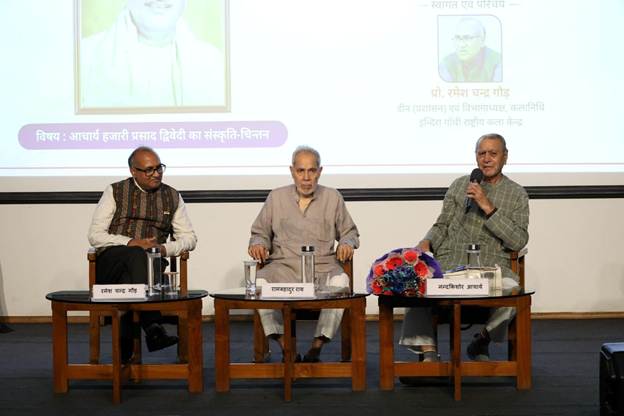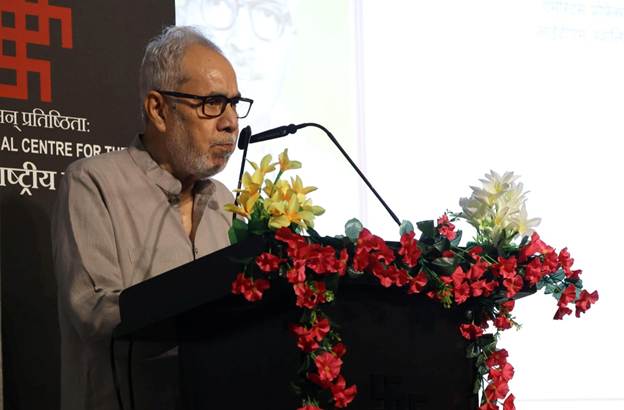“Culture is the growth of inner life, a pursuit beyond mere external systems.” Prof. Nandkishore Acharya
“Culture is the growth of inner life, a pursuit beyond mere external systems.” Prof. Nandkishore Acharya
Indira Gandhi National Centre for the Arts, Kala Nidhi Division, organised the ‘Acharya Hazari Prasad Dwivedi Smarak Vyakhyan’ (Acharya Hazari Prasad Dwivedi Memorial Lecture) on the topic ‘Acharya Hazari Prasad Dwivedi ka Sanskriti-Chintan (Cultural Thought of Acharya Hazari Prasad Dwivedi)’. The lecture was delivered by renowned scholar Prof. Nandkishore Acharya, Former Emeritus Professor, ITM, Gwalior. The programme was presided over by Shri Ram Bahadur Rai, President of the IGNCA Trust, while the welcome address and introduction were presented by Prof. Ramesh Chandra Gaur, Dean (Administration) and Head, Kala Nidhi.

Prof. Nandkishore Acharya said that the cultural philosophy of Acharya Hazari Prasad Dwivedi remains highly relevant today. Speaking at the Acharya Hazari Prasad Dwivedi Smarak Vyakhyan (Acharya Hazari Prasad Dwivedi Memorial Lecture), he highlighted that culture is the development of the inner self and the pursuit of values, whereas civilization relates to external systems like social, political, and economic structures. He emphasized Dwivedi ji’s view that civilization should serve as a means to achieve cultural values, and that real cultural progress is possible only when external systems align with these values. Prof. Acharya further explained Dwivedi ji’ s belief that values are universal and rooted in cosmic truth, beyond artificial divisions of East and West, and that true culture moves toward unity and harmony, not division.

Referencing the concept of Panchakosha, he noted that the ultimate goal is ‘Anandamaya Kosha’-a state of bliss, with other values serving as supportive elements. He also mentioned Dwivedi ji’s interpretation of ‘Rita’ (cosmic order) and ‘Anekantavada’ (plurality of truth), stating that culture must remain democratic, as no single perspective holds the entire truth. Prof. Acharya concluded by reiterating Dwivedi ji’s conviction that the journey towards complete culture is continuous and global consensus, not just a global market, will eventually lead humanity towards higher consciousness and unity.
Shri Ram Bahadur Rai, in his presidential address, said that listening to Prof. Nandkishore Acharya on Acharya Hazari Prasad Dwivedi’s cultural philosophy was an enriching experience. He recalled his personal memories of Dwivedi ji during his student days at Banaras Hindu University and highlighted Dwivedi ji’s unique ability to keep his doors open for all students. Shri Rai referred to Dwivedi ji’s writings, particularly his essay on Indian culture as an evolving tradition. He noted Dwivedi ji’s emphasis that Indian culture has remained dynamic by assimilating new ideas while retaining continuity with ancient wisdom. “Our sages discovered-not created-fundamental principles like the law of karma and rebirth, which became integral to the cultural stream,” he observed.
Shri Ram Bahadur Rai underlined Dwivedi ji’s view that Indian culture responded to major challenges through adaptation, citing the Bhakti movement as a response to Islamic influence and later interactions with Western modernity. According to Dwivedi ji, the arrival of the British created new cultural ruptures, but also initiated the process of integration with modern science, technology, and rational thought. Dwivedi ji believed that this emerging global culture would be enriched by India’s multifaceted experiences. He concluded by emphasising that Dwivedi ji saw culture as a supreme form of reflection and that today, when cultural questions dominate discourse, his thoughts remain profoundly relevant. In this context, he remarked, “He belongs among the ranks of our great thinkers, and his ideas will continue to inspire generations.”
In his opening remarks, Prof. Ramesh Chandra Gaur delivered the introduction to the lecture and spoke about the IGNCA Library and its private collections, which also include the personal collection of Acharya Hazari Prasad Dwivedi. He invited researchers and other visitors to explore the IGNCA Library. The lecture was attended by scholars, researchers, and members of the cultural fraternity, who had the opportunity to engage with Acharya Dwivedi’s ideas in new contexts. The programme concluded with a vote of thanks.
****
Sunil Kumar Tiwari